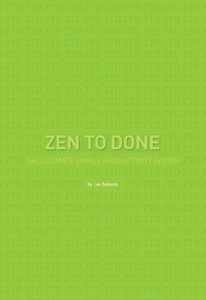I am a huge fan of the Getting Things Done (GTD) productivity system based on a book by David Allen. It has probably been two years since I first read the book and began implementing the system myself. It is intentionally something that is meant to be adapted for each person, but the main principles are the key to it’s success:
1. Collect
2. Process
3. Organize
4. Review
5. Do
The main focus of the system is to get things out of your head and into a trusted system of lists, calendars, and reminders so that you don’t spend your time worrying about what you should be doing or feeling guilty about what you haven’t completed at any given time.
Zen to Done: A Refreshing Perspective on GTD
 A couple of weeks ago I noticed that the eBook version of Zen to Done was available on Kindle for free. Publishers and authors tend to set the digital list price of their books at free for a short time to boost a book’s rankings when it switches to the real price. I just happened to catch it while it was on sale. Having read this short little eBook, though, I would gladly pay the money. It has already made a big impact on my always-evolving GTD system.
A couple of weeks ago I noticed that the eBook version of Zen to Done was available on Kindle for free. Publishers and authors tend to set the digital list price of their books at free for a short time to boost a book’s rankings when it switches to the real price. I just happened to catch it while it was on sale. Having read this short little eBook, though, I would gladly pay the money. It has already made a big impact on my always-evolving GTD system.
Zen to Done is written by Leo Babauta of Zen Habits–probably the most popular personal development blog on the Internet and admittedly a subconscious influence on Prayer Habits.
The book is divided into seventeen chapters and ten habits. Those who are familiar with the GTD system will recognize the ten habits:
1. Collect
2. Process
3. Plan
4. Do
5. Simple, Trusted System
6. Organize
7. Review
8. Simplify
9. Routine
10. Find Your Passion
Why Zen To Done (ZTD) Made an Impact on Me
Getting Things Done (GTD) can be very overwhelming and seems almost impossible when you first start.
That is why I love the constant theme of ZTD: form one habit at a time. Focus your efforts on integrating just one habit rather than the entire system all at once. Once you have little wins, you can move on to accomplish much greater things.
Clearly I’m a fan of habits (hence the name prayer habits) and I have realized the impact of developing good habits in my own spiritual life.
Habit-formation takes time. Leo suggests taking a 30 day challenge to ingrain the habit in your system. I’ve heard elsewhere that 21 days are the minimum for habit formation. Either way, I love the idea of focus to improve productivity and peacefulness.
It also helped me to reexamine my system, analyze my strengths and commit to developing better habits in the areas I’ve shown weakness.
I realized that I’m very good at these habits:
- Collect
- Process
- Simple, Trusted System
- Find Your Passion
But lately, I’ve been struggling with
- Plan
- Do
- Organize
- Simplifying
The Impact
In the digital world, cost becomes so interesting. We almost expect digital resources to be free. I got this book for free by chance, but the value it has given me is so much greater than the $5 price tag on the Kindle version right now.
Singletasking
The #1 habit I am working on right now is “Singletasking,” which is the main focus of the “Do” habit.
I’m making a commitment to closing Outlook, Gmail, and other applications that are not absolutely necessary to the task at hand.
Believe me, my productivity has gotten a huge boost but more importantly I’m able to feel good about what I’ve accomplished in a given period of time or a given day.
I also took a lesson from the “routine” habit and wrote out a much better system for managing social media–an essential way to build relationships and gather in formation, but a highly tempting form of distraction.
The MITs
Along with the commitment to singletasking, I’m putting a greater focus on what Leo takes from Steven Covey’s 7 Habits of Highly Effective People: the Most Important Tasks (MITs).
I’ve been incorporating this into my productivity system since 2009 when I read Tim Ferriss’s 4-Hour Work Week. In that book, Ferriss talks about the importance of using the Pareto Principle (the 80/20 rule) to decide what your most important tasks are for each day to and to relentlessly complete these tasks for the biggest wins.
So at my desk I write down 2-3 tasks I have to get done in a given day and use the singletasking habit to relentlessly achieve them.
GTD or ZTD?
To be honest, I know I wouldn’t have gotten as much out of ZTD if I hadn’t started to implement GTD. Leo leaves out a lot of essential parts of GTD that need a context to successfully implement most of the habits he suggests.
First buy Getting Things Done, then fail to implement it, then read Zen to Done, and you’ll feel much less overwhelmed.
(This post contains affiliate links to Amazon.com.)


